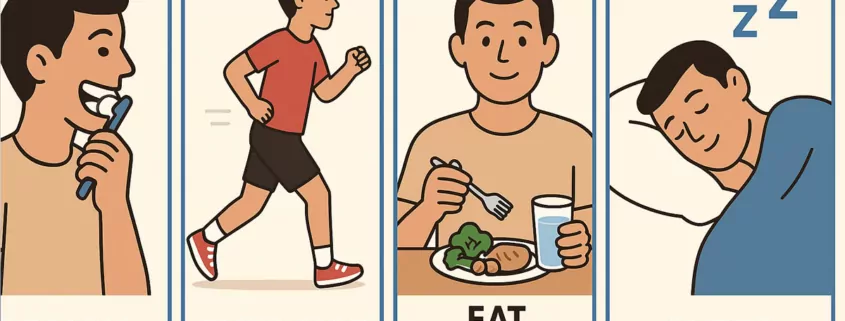How to Build a Daily Routine for Your Health – Step By Step Guide
Creating a daily schedule might look like an easy task, but the problem comes when one has to stick to the routine. The utility of the daily planner is diminished by the numerous distractions and surprises that one encounters on a day-to-day basis. In spite of obstacles, it is worth mentioning that a standard health routine significantly improves the mental and physical state of an individual. A strong routine helps tame the chaos, which allows one to cultivate their feeling of well-being, focus, and greater fitness.
As always, achieving goals requires starting from the ground. There is no need to turn your life upside down with rigid changes. Start off by doing small tasks such as stretching and making a healthy breakfast. Maintaining your well-being can also be achieved by using some natural products. As personal preferences go, some people tend to use lab tested thca flower for its calming impact.
Strength of Motivation
Scheduling tasks within the framework of a set routine gives a predetermined order to changes in activities. A well-thought-out routine will let the individual focus on doable tasks. Without a clearly defined routine, it is not uncommon for people to feel overwhelmed and at a loss for words. Incorporating structure into one’s life develops a psychological pattern that can be useful in many different areas of life. This makes the individual feel energized and cuts down the mental load that comes with repetitive, stronger decisions. A routine does not imply that every minute needs to be diarized. Rather, it offers a sense of direction. For instance, waking up at a specified time daily will ensure that your body clock regulates itself, giving you better sleep at night. When routines are automated, you find ease and confidence in completing different tasks throughout the day.
Beginning Your Morning Positively
How one starts one’s morning can determine how productive one is throughout the day. Something that can help you feel more alert and set your body rhythm is waking up at the same time every day. Remember to avoid reaching for the phone immediately. Instead, spend a few seconds breathing deeply or stretching. This makes waking up mentally and physically easier.
Drinking water as soon as one wakes up helps rehydrate because water has not been consumed for hours. Metabolism can be bolstered by drinking water as well. It is critical to have a healthy breakfast that includes proteins, fibers, and healthy fats. Ensuring your body receives the proper nutrients in the morning helps prevent one from feeling drained later in the day.
Maintaining Your Energy Levels Through the Day
Most people experience an energy slump by mid-day, and that’s completely normal. Taking a brief respite from your work for five to ten minutes can help you reset. If possible, step outside. Sunshine and clean air improve your mood and alertness. And if you are at work or studying, changing the subjects you are studying also helps to give your brain a break.
It is good practice not to have heavy lunches and also to have something that is healthy. You should not skip your meals or eat excessively fast during lunch hour. Not observing meal times may result in blood sugar dips, which can lead to increased irritability or fatigue. In cases where there are defined laws regarding personal lifestyles and well-being, being aware is equally important. Understanding such lateral policies as California vaping laws enables more strict adherence to such regulations, which control where and how e-cigarettes are vaped in public places.
How To Use Your Afternoon Effectively
The post-lunch hours in the workday can often feel monotonous, but they certainly shouldn’t be considered unproductive. This time can serve as the best opportunity to tackle tasks that are either creative or need problem-solving abilities. From a personal perspective, if your schedule permits, try to plan your most demanding tasks for this period, as one’s mind tends to be sharper after lunch.
Block work can improve your concentration. For example, working for 25 minutes straight and then allowing 5 minutes to rest is a better way to give your brain a chance to recover. This cycle done over the span of an hour or two creates reduced stress and improved concentration. Along with these, it is also advisable to keep active. For instance, if you are seated for long periods, set a reminder to stand and stretch every hour. These minimal physical activities improve blood flow and even lessen tension in the muscles.
Developing an Evening Routine That Enhances Sleep
Use your evenings to gently unwind and prepare for sleep. Your body starts to recognize signals when you go to bed after completing the same routine every night. Start with activities such as listening to soft music or reading a physical book. If possible, try to avoid screens at this time. The light emanating from phones and tablets can inhibit one’s ability to fall asleep.
Make sure you keep dinner light and do not consume any caffeine during the evening hours. Taking a walk after dinner is helpful both for relaxation and digestion. If you are looking for other ways to relax, journaling is very effective. If you have had a particularly busy day, putting your thoughts on paper can prove to be helpful and allow you to fall asleep without worries of an overflowing mind.
Adjusting and Reviewing Your Routine
No one gets it right on the first try. It is absolutely essential to take a step back and check in with yourself from time to time. Which parts of the routine are working, and which do not feel effortless? Perhaps you keep skipping breakfast or going to bed too late. It is these small problems that, when ignored over a span of time, can create bigger issues.
Check-ins on a weekly basis are productive. They do not require much of your time. Take a few minutes on Sunday evening or Monday morning to think about your upcoming days and routines. Consider your feelings and what changes can be made. Small changes give you flexibility and help you feel in control without being overwhelmed.
Eating and Moving with Purpose
Good nutrition and exercise are two cornerstones of health. You don’t have to go to a gym every day or have a particular diet plan to follow. A more relaxed approach like eating whole foods and exercising your body can yield significant results. Short walks, stretching, and home workouts count as exercise too. As long as you keep moving regularly, you are doing well.
Focus on keeping your meals enjoyable and straightforward. Lean proteins, whole grains, fruits, and vegetables provide essential nutrition. Practicing mindful eating allows you to recognize your hunger cues as well as when you have consumed enough food. Regular consumption of water throughout the day is another little change that has great benefits. You should carry a water bottle with you and sip it frequently.
Conclusion
A balanced daily routine fosters productivity, tranquility, and energy. It aids in stress management, helps you remain focused, and improves sleep. This doesn’t mean you have to get everything right the first time. Small wins go a long way. This will give you room to grow, and in time, you will discover a rhythm that feels natural to you. Integrating health with daily activities can transform it from feeling like a chore to a rewarding lifestyle that enhances your overall endeavors.
- Best Delta-8 THC Carts of 2025: Top 5 Vapes Reviewed - July 16, 2025
- UK Vape Ban: Your Guide to Legal Alternatives in 2025 - July 4, 2025
- The Global and U.S. Vaping Industry in 2025: Growth, Challenges, and Opportunities - May 27, 2025









